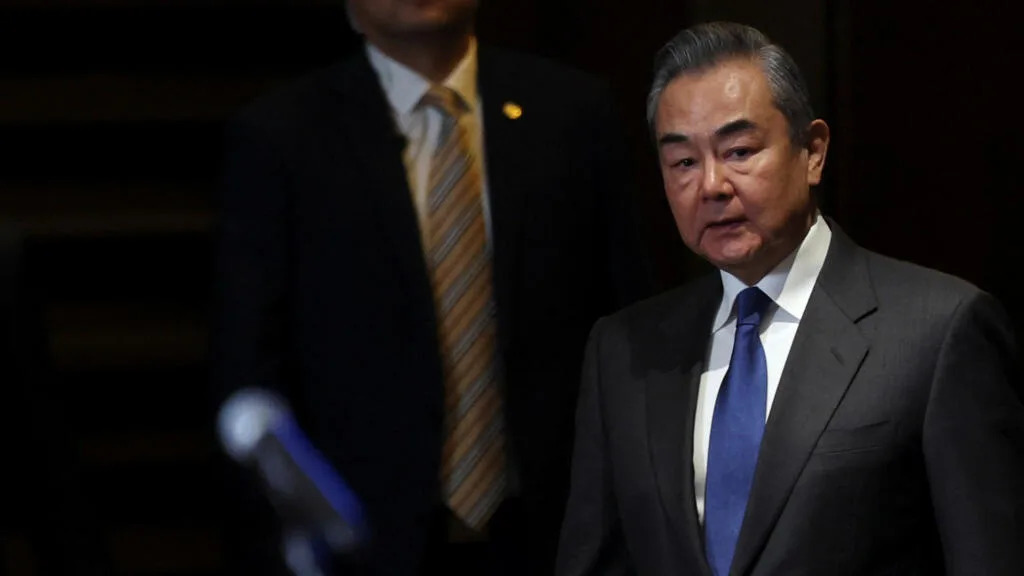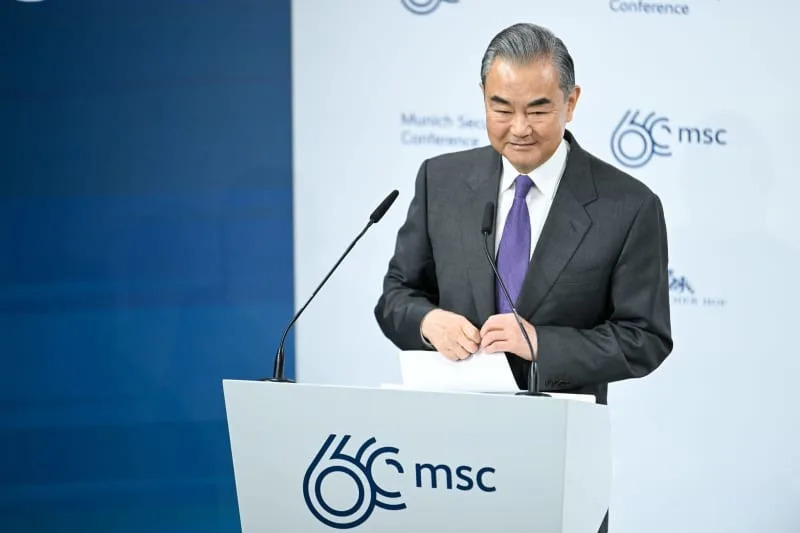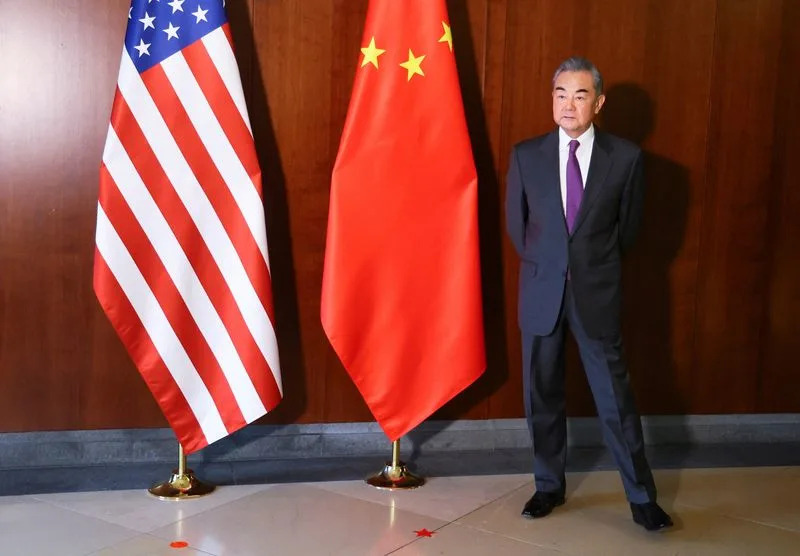Chinese Foreign Minister Wang Yi gave a forceful defence of Beijing's ties with Moscow and warned the West not to cross red lines on Taiwan, during a combative speech at the Munich Security Conference on Saturday.
At a gathering dominated by the prospect of a US retreat from the international stage under a second Donald Trump presidency, Wang pitched Beijing as a reliable actor.
"No matter how the world changes, China is a responsible major country that will keep its major principles and policies consistent and stable ... In a turbulent world China will be a force for stability," he said.
But - just a day after Wang met his US counterpart Antony Blinken - there were also thinly veiled swipes at the United States and a firm rejection of a direct request for China to rein in Russia, almost two years into its invasion of Ukraine.
On Ukraine, Beijing's top diplomat said China had been "working relentlessly to promote peace and peace talks", but there were "not ripe conditions in place for parties to go back to the negotiating table".
According to Bloomberg, Ukrainian Foreign Minister Dmytro Kuleba was seeking to meet Wang at the Munich event to try and convince Beijing to take part in a Kyiv-backed summit on peace.
Countering criticism of Beijing's close ties with Moscow, Wang said the relationship was based on "no alliances, no confrontation and not targeting any third party".
European leaders have frequently pointed to Chinese President Xi Jinping's regular contacts with Russian counterpart Vladimir Putin since the start of the war, compared with his single telephone call with Ukrainian President Volodymyr Zelensky. They say that Beijing has sent a delegate to only one of a series of Kyiv-backed peace talks.
But Wang said Xi had "in-depth exchanges with world leaders including Russian and Ukrainian leaders" and China's special envoy, Li Hui, had "travelled intensively to mediate among different parties".
The veteran diplomat laughed when moderator and conference chairman Christoph Heusgen asked if China would accept a "code of conduct for the South China Sea", given the threats to navigation and "risky encounters" in the disputed waters and the Taiwan Strait - as well as the Red Sea.
"The Taiwan question cannot be compared with what's happening in the Red Sea. The Taiwan question is China's internal affair ... Taiwan is a part of China. It has never been a country," Wang said.
Turning to the Middle East, he called for a two-state solution in the Israeli-Palestinian conflict, continuing an effort to present Beijing as the leader of the Global South.
"Efforts should be made towards a two-state solution. Only when that is realised can the state of Palestine and the state of Israel live in peace, and with assurance from the international community, can enduring security enjoyed by Israel," Wang said.
He dismissed concerns about the Chinese economy and warned those considering de-risking that "the world economy is like a big ocean that cannot be cut into isolated lakes".
"Those who attempt to shut China out in the name of de-risking will make a historical mistake," Wang said, adding that the "global economy was weighed down by protectionism".
Asked about fresh allegations of forced labour in the western Chinese region of Xinjiang that have prompted big German companies BASF and Volkswagen to reassess their presence there, Wang gave the claims short shrift.
"We have seen so much fabricated information from different parties," Wang said. "The so-called forced labour is only a groundless accusation."
He invited conference attendees to go to Xinjiang, saying it was "open to all that are interested to visit".
Previously, European diplomats in Beijing have declined invitations to the region because they were not allowed to meet detained members of the Uygur community.
Wang's midday appearance on the second day of the annual gathering Munich, billed as the "Davos of Defence", followed addresses by German Chancellor Olaf Scholz and Zelensky.
Amid concerns that a returning Trump would abandon Kyiv if he won the presidential election in November, Zelensky invited the former US president to Ukraine to see the "real war". "If Mr Trump will come, I am ready to go with him to the front line," he said.
On Friday, in a whirlwind of diplomacy in the Bavarian city, Wang sat down with counterparts from Britain, the European Union, and the US.
After the Wang-Blinken meeting, both sides issued statements that were markedly more conciliatory than a year earlier when the pair met in Munich amid a row over a Chinese surveillance balloon.
Speaking on the Munich stage after Wang, Blinken said: "We have an obligation to manage that relationship responsibly, and I think that's something that we hear from countries around the world."
In separate talks with British Foreign Secretary David Cameron, Wang urged Britain to "properly handle differences and conflicts, and push China-UK relations back to the right track", according to a Chinese foreign ministry account.
Cameron raised "a number of areas of disagreement, including on human rights in Xinjiang and Hong Kong", a British readout said.
The former prime minister also raised objections to British lawmakers sanctioned by China and "reiterated his call for the release of British national Jimmy Lai".
China's top diplomat to visit Germany, France and Spain to ease relations
China's top diplomat Wang Yi will visit Germany for the Munich Security Conference then travel to Spain and France in the coming days, Beijing's Foreign Ministry said Thursday.
A spokesperson said in a statement that Minister of Foreign Affairs Wang Yi will attend the 60th Munich Security Conference between 16 to 21 February to deliver a speech.
He will then visit Spain and France, where he will "hold the China-France Strategic Dialogue," they added.
The conference brings together military elite from around the world and is seen as a barometer of transatlantic relations. It starts on Friday.
Wang will use his speech there to "elaborate on China's propositions on building a community with a shared future for mankind and advocating an equal and orderly multipolar world," the foreign ministry said.
His visit to Spain will be the Chinese foreign minister's first in six years, Beijing said.
China said the visit will "consolidate mutual trust, enhance friendship, promote cooperation and enrich the China-Spain comprehensive strategic partnership".
Beijing also hopes to "deepen strategic communication, consolidate political mutual trust, advance practical cooperation and people-to-people and cultural exchanges" with France, it added.
According to the website of China's Ministry of Foreign Affairs, Wang Yi’s visit to France will be the "first important visit between the two countries this year". Wang will also meet with Macron's Diplomatic Adviser Emmanuel Bonne.
Chinese foreign minister calls for negotiated peace in Ukraine
Wang Yi, Chinese Foreign Minister, delivers a speech at the 60th Munich Security Conference (MSC)
Chinese Minister of Foreign Affairs Wang Yi once again called for a negotiated diplomatic end to the war in Ukraine in a speech on Saturday at the Munich Security Conference.
Wang said that China is working tirelessly to find a political solution to the crisis.
Wang once again avoided condemning Russia's ongoing invasion of Ukraine. China, a Russian ally, has strenuously avoided taking a direct public position on the war.
China's diplomacy has one goal, according to Wang: to pave the way for peace talks, prevent a vicious cycle of violence and stabilize the situation.
The security interests of both Russia and Ukraine must be recognized in any settlement to the conflict, Wang said.
Russian officials were not invited to take part in the Munich Security Conference, a major annual gathering of world leaders and foreign policy experts.
Wang also called for a ceasefire in Israel's ongoing war in the Gaza Strip, saying that the fighting must stop and humanitarian aid corridors are urgently needed.
The Chinese minister also said that the only way for Israelis and Palestinians to live in peace was through a two-state solution that recognizes an independent Palestinian state.
Wang presented his country as a mediator in a whole series of conflicts, describing China as a force for stability even on difficult issues.

China foreign minister warns against decoupling at Munich Security Conference
Chinese foreign minister Wang Yi warned the West that it would be making a historical mistake if it sought to decouple from China in the interests of reducing risk.
"Whoever tries de-sinicization in the name of de-risking would be making a historical mistake," Wang said in a speech on Saturday at the Munich Security Conference.
His comments came amid calls over the last year from the United States and the European Union to reduce their dependence on China.
During a meeting with U.S. Secretary of State Antony Blinken at the conference on Friday, the Chinese foreign minister also stressed that "making 'de-risking' into 'de-China', and seeking 'decoupling from China'" will only backfire on the U.S. itself".
The European Commission last month set out plans to bolster the European Union's economic security through closer scrutiny of foreign investments and more coordinated controls on exports and outflows of technologies to rivals such as China, which raised concerns from China's Chamber of Commerce to the EU.
The plans highlight "de-risking", the EU's policy of reducing economic reliance on China, which the bloc regards with suspicion due to its close ties to Russia.





